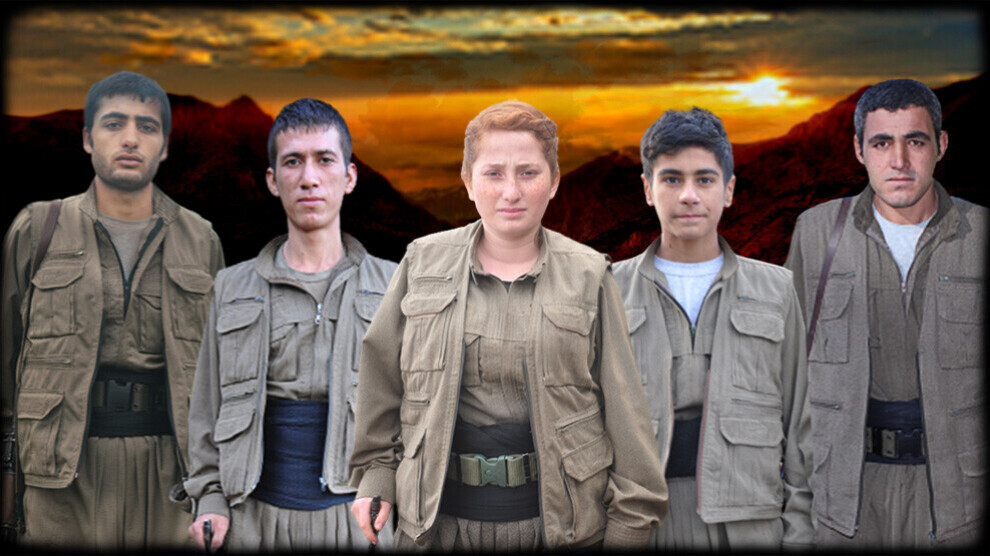HPG pays tribute to guerrillas who fell in 2017
Guerrillas Bişeng Rojdem Giravî, Çiya Roza, Serhed Silopî, Rêber Cûdî and Amed Dersim fell in 2017 in attacks carried out by the Turkish state in the Medya Defense Areas.
Guerrillas Bişeng Rojdem Giravî, Çiya Roza, Serhed Silopî, Rêber Cûdî and Amed Dersim fell in 2017 in attacks carried out by the Turkish state in the Medya Defense Areas.

The Press Center of the People's Defense Forces (HPG) has published the names of five guerrillas who died at different times in 2017 fighting Turkish occupation in the Medya Defense Areas. The HPG paid tribute to the “fallen comrades, who dedicated their lives to defending their people threatened by genocide and who resisted in their positions until the last moment.” The HPG expressed its condolences to the relatives of the martyrs and the Kurdish people.
The names of the fallen guerrillas are as follows:
 Codename: Bişeng Rojdem Giravî
Codename: Bişeng Rojdem Giravî
Name and Surname: Nazlı Yalçın
Place of Birth: Wan
Mother and father’s name: Kıymet – Idris
Time and Place of Death: 2017 / Medya Defense Areas
 Codename: Çiya Roza
Codename: Çiya Roza
First and last name: Yusuf Aydın
Place of Birth: Wan
Mother and father’s name: Güvercin – Dîno
Time and Place of Death: 2017 / Medya Defense Areas
 Codename: Serhed Silopi
Codename: Serhed Silopi
Name and Surname: Ibrahim Avcı
Place of birth: Şirnex
Mother and father’s name: Zehra – Neşet
Time and Place of Death: 2017 / Medya Defense Areas
 Codename: Rêber Cûdî
Codename: Rêber Cûdî
Name and Surname: Necmettin Çapan
Place of birth: Şirnex
Mother and father’s name: Ayşe - Yasin
Time and Place of Death: 2017 / Medya Defense Areas
 Code name: Amed Dersim
Code name: Amed Dersim
First and last name: Fuat Ahmet Ismail
Place of birth: Aleppo
Mother and father’s name: Emine – Ahmed
Time and Place of Death: 2017 / Medya Defense Areas
Bişeng Rojdem Giravî
Bişeng Rojdem Giravî was born in Wan (tr. Van) into a family connected with the Kurdish liberation struggle. Her parents belong to the Giravî tribe and lived in a village in Elkê (Beytüşşebap), a district town of the Kurdish resistance province of Şirnex, until they were forcibly expelled by the Turkish state.
This experience and the continued policy of repression shaped Bişeng Rojdem Giravî. In 2015 - the year in which the Turkish state abruptly ended the peace process with Abdullah Öcalan and sparked total war against Kurdistan - Bişeng Rojdem Giravî left high school in twelfth grade and went to the guerrillas in the mountains. She gained her first ideological and practical experience in combat in the Zap, where she joined the autonomous women's guerrilla YJA Star. Until her death, she took part in the resistance against the Turkish occupation in various regions of the Medya Defense Zones.
Ciya Roza
Çiya Roza was born in Bêgirî (Muradiye), also in Van, to patriotic parents. In order to support the rather financially poor family, he left the middle school and worked in construction. At that time, he became the focus of the "special war policy" in force in Kurdistan. The methods of this special warfare include, among other things, state-sponsored drug use.
Çiya Roza was a drug addict for almost six years and was forced to become an agent. In 2014 he managed to evade this system. He made the decision to join the guerrillas and went to Botan. Arriving in the mountains, he went to Avaşîn for training, where he stayed for about two years. As of 2016, Çiya Roza fought in Cîlo, specifically in the Çarçella region.
Serhed Silopî
Serhed Silopî was born in Şirnex into a family belonging to the Teyî tribe. He grew up in a patriotic environment and was involved as an adolescent within the youth movement for the Kurdish liberation struggle. Impacted by the emergence of the terrorist organization Islamic State in Syria and Iraq and the loss of friends and relatives who died fighting the militia, Serhed Silopî went to the mountains.
He completed his military training in Heftanin, where he then took part in the fight against the Turkish occupation. After two years, he was transferred to the HPG headquarters, where he was part of the team of Bedran Gundikremo (also Bedran Cûdî, bourgeois Sait Tanıt). The longtime guerrilla commander was killed in April 2017 in a Turkish air raid on Amedi in southern Kurdistan.
Rêber Cudî
Rêber Cûdî was born in Silopi near Şirnex. His parents' hometown was set on fire and destroyed by the Turkish army in the 1990s as part of the "scorched earth policy".
Rêber Cûdî grew up in an environment shaped by the resistance tradition of the Botan region. In 2015, he too joined the guerrillas at the start of the “total war of annihilation” in Kurdistan. He had chosen August 15 as the day of his connection. On this date, in 1984, the PKK launched its armed resistance to Turkish state power. After a while in the mountains of Şirnex, Rêber Cûdî went to Metîna.
Amed Dersim
Amed Dersim was born to Kurdish parents in the northern Syrian governorate of Aleppo. He came from the town of Arnê (Tell Aran), which is mostly inhabited by Kurds. His family was a patriotic one and became politicized during Abdullah Öcalan's time in Syria and Rojava in the 1980s and 1990s.
In the nearly two decades of his stay in Syria and neighboring Lebanon, the Kurdish pioneer planted the seeds for the liberation struggle that made the Rojava revolution possible in 2012 and is still ongoing today. This event shaped Amed Dersim and he decided to take part in the Kurdish resistance. He chose the mountains of Kurdistan. There he played a leading role in the switch to tunnel warfare and the expansion of underground guerrilla installations.